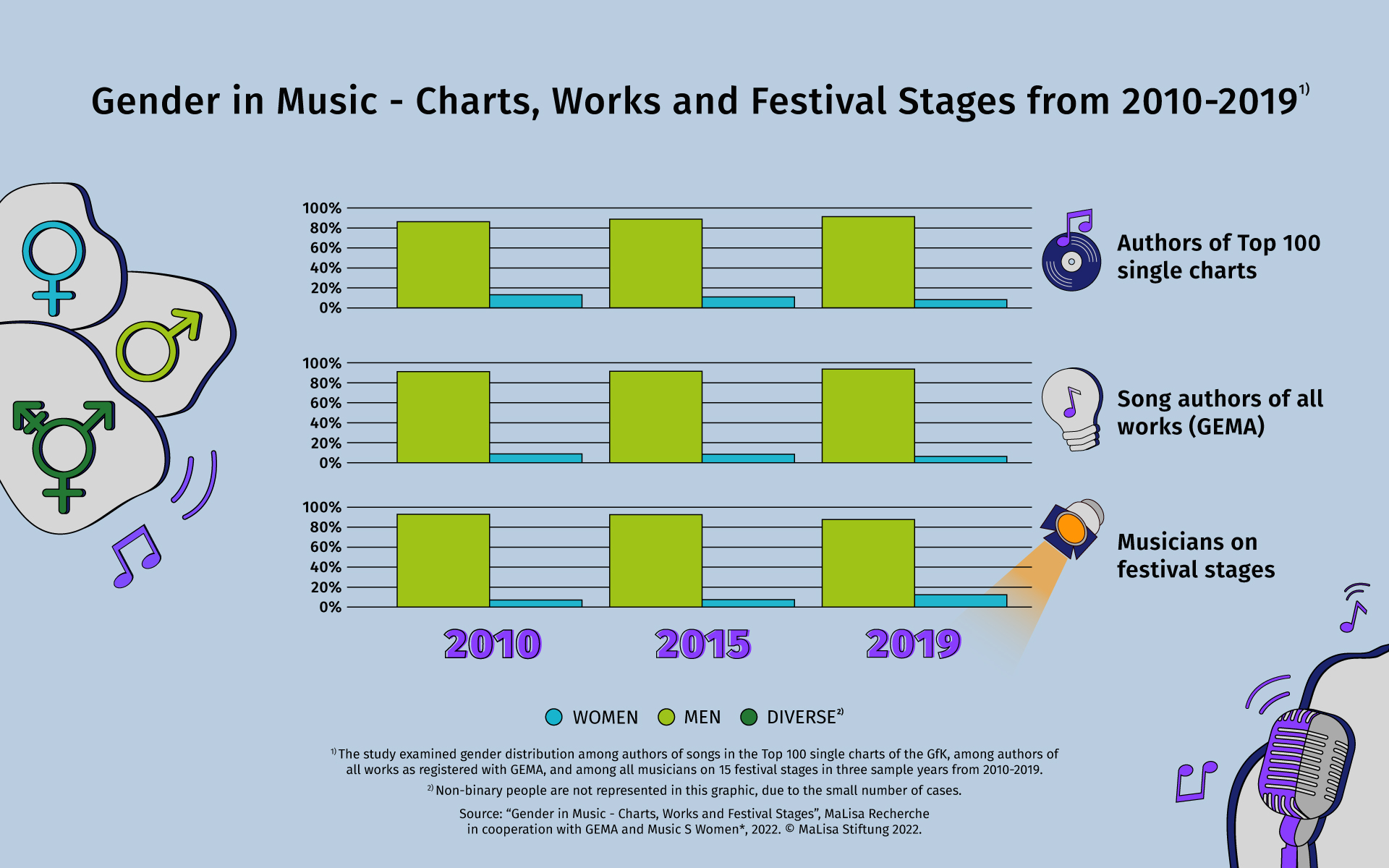GENDER IN MUSIC – NO EQUALITY OF OPPORTUNITY IN THE MUSIC INDUSTRY

New research by the MaLisa Foundation: Industry remains highly male-dominated
Research by the MaLisa Foundation, in cooperation with GEMA and Music S Women, shows that there has been little change in terms of equality of opportunity since 2010. The study, “Gender in Music – Charts, Works and Festival Stages”, focuses on gender distribution in the charts, in GEMA work registrations and on festival stages. The results reveal a clear imbalance. On September 22, 2022, the new data will be discussed at the Reeperbahn Festival. Afterwards, the MaLisa Foundation, in cooperation with GEMA and Music Women Germany, will host a showcase with rap artists Älice, Babyjoy, KERFOR, Nashi44 and Vita.
The structural discrimination of women and non-binary people in the music industry is a much-discussed topic, not the least thanks to numerous initiatives that address the issue. But what has actually changed on this front in recent years? The MaLisa Foundation, together with GEMA and Music S Women*, provides new data.
The analysis is based on evaluation of the Top 100 singles charts, works registered with GEMA, and 15 different festivals in three sample years within the period from 2010 to 2019. Regardless whether in songwriting, the charts, GEMA membership, the songs registered there or on the festival stages: The proportion of women remains well below one-fifth in all areas. And no clear upward trend can be detected within the period studied. In fact, there was even a regression in certain areas. Only festivals show a tentative upward trend in the proportion of women. Non-binary people and other gender identities were virtually impossible to identify.
More than 85% of the music in the German weekly charts is composed by men. In the period studied, there was even an upward trend in the proportion of men. Eighty-five percent of GEMA members are men. A look at the songs registered with GEMA reveals an even greater imbalance: While the number of songs registered each year has increased significantly since 2010, the proportion of women involved has fallen from less than 9% in 2010 to 6% in 2019. On festival stages, participation of female musicians remains below 10% on average in the observed period. However, an overall increase in the proportion of women can be observed over time, from around 7% in 2010 to just over 12% in 2019. Additional evaluation of the year 2022 showed a positive upward trend, with a female proportion of 16%.
Who is Shaping the Music of the Future?

“The music industry continues to be a boys’ club,” says Elisabeth Furtwängler, initiator of the research, “but knowing that injustices exist is a good prerequisite for changing things. We can all contribute to equal opportunity in the industry. Let’s talk about it, tear down barriers and create an empowering environment – so that all genders have the opportunity to express their creativity and gain recognition.”
Matthias Dengg, Senior Communications Manager, GEMA: “At least half of our population is female. But we are far from a 50/50 balance, as our analyses have shown. We, as GEMA, merely reflect the industry and the conditions within it, also in terms of gender distribution. But we should all constantly and repeatedly ask ourselves the question: What can we do to shape an industry that is equally inclusive for all?”
“With this extensive research, we provide a detailed view of gender equity on festival stages in the German-speaking world and establish facts in order to discuss and work on solutions objectively,” says Susann Hommel, Music S Women*. “While there are formats that clearly require improvement, there are also festivals that are now leading the way when it comes to diverse booking. That gives us cause for hope.”
Panel, Reception & Showcase at the Reeperbahn Festival
The research will be discussed on September 22, 2022, at the Reeperbahn Festival, on the panel “The End of the Buddy Business? Who will shape the music of the future?”, organized by the MaLisa Foundation together with GEMA and the Keychange initiative. Afterwards, the MaLisa Foundation, Music Women* Germany / Music S Women* and GEMA are hosting a reception at Sommersalon. At the following Fem* Rap & Production Showcase, presented by MaLisa Stiftung, rap artists Nashi44, Älice, Babyjoy, Vita and KERFOR will perform. An afternoon with 100% female powered voice and sound, hosted by poet & singer Julia Engelmann and Elisabeth Furtwängler, also known as rapper & producer under the name KERFOR.
The complete results of the research, the corresponding graphics and a photo of Elisabeth Furtwängler can be found here: https://malisastiftung.org/en/gender-in-music/